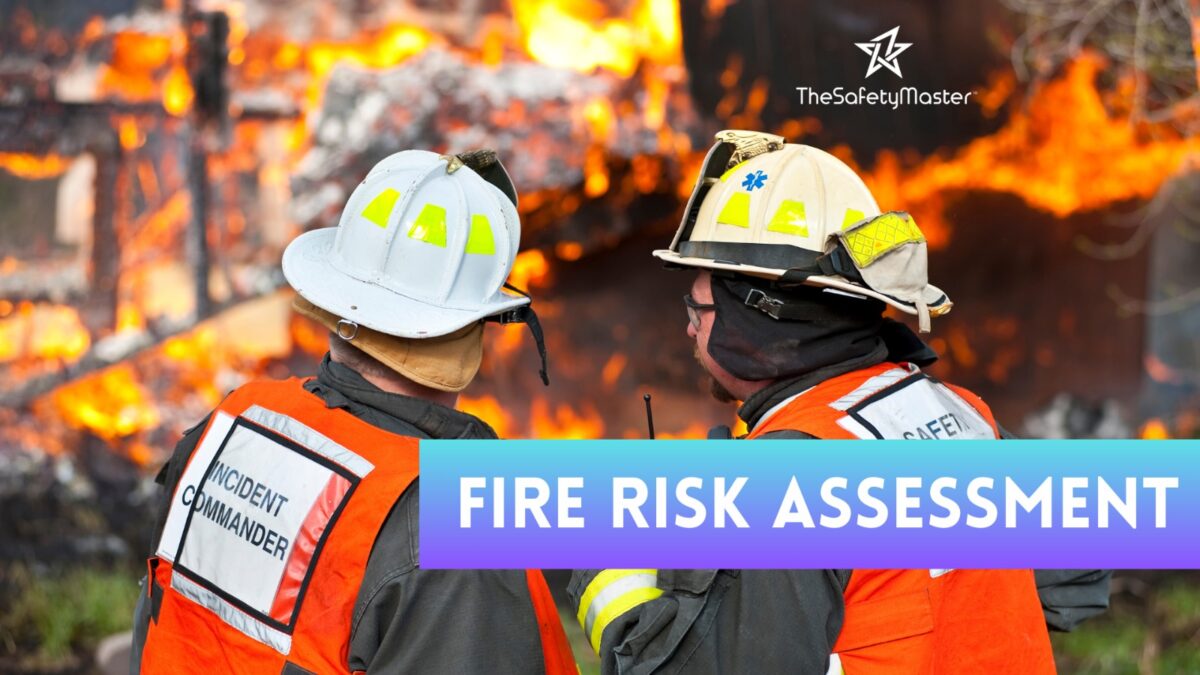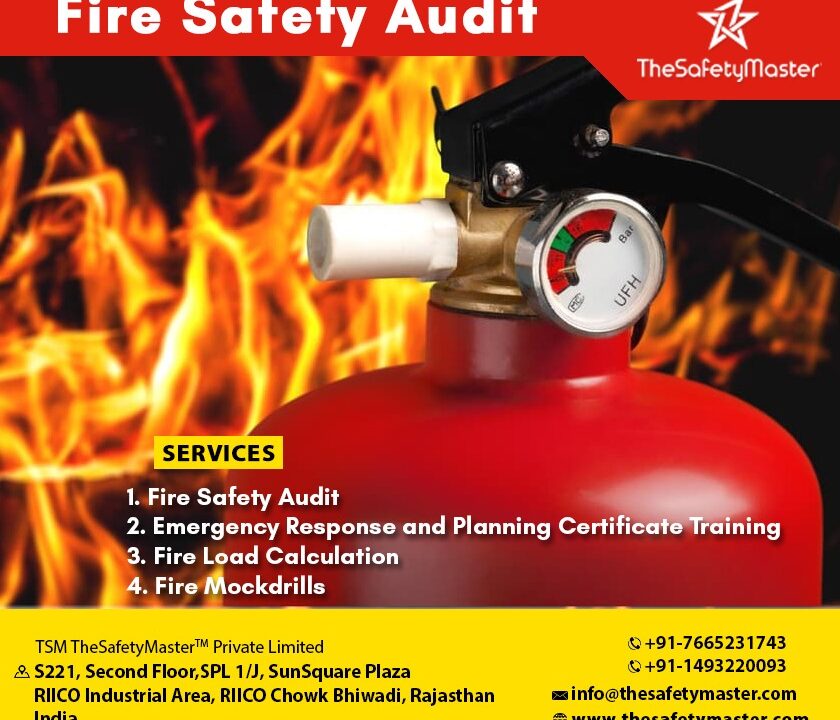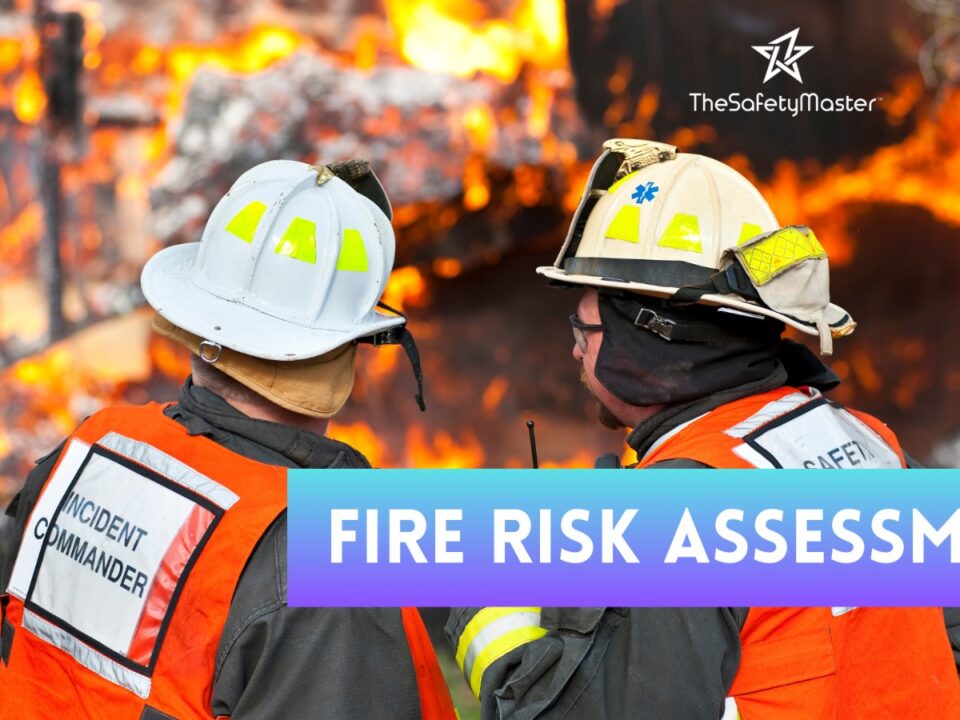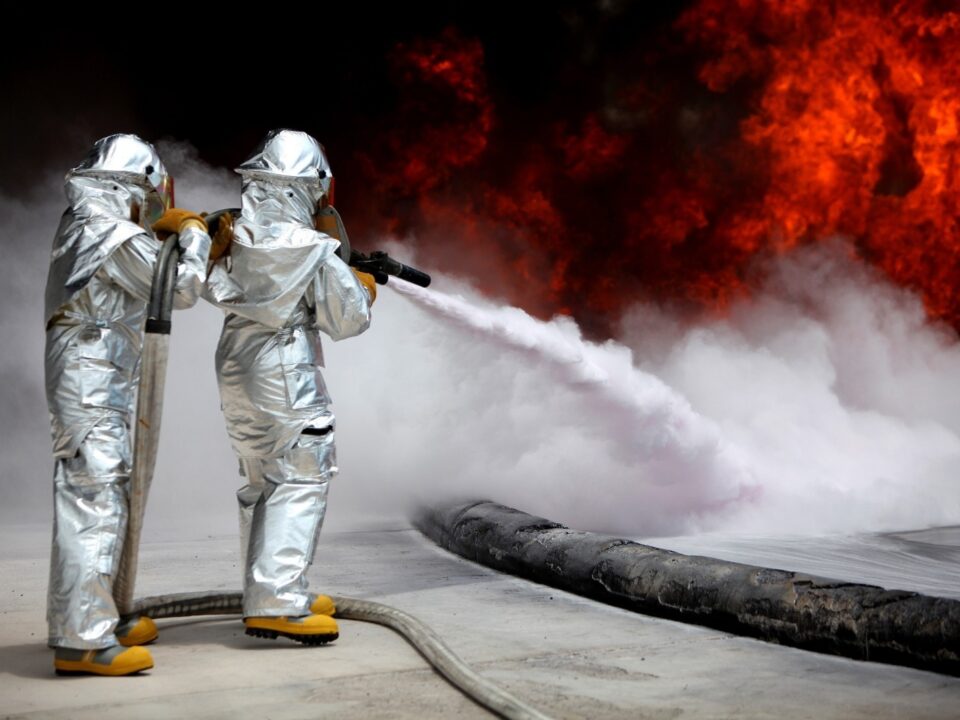Proactive Measures for Fire Prevention: Implementing Fire Safety Audits in Indian Industries

The Vital Importance of Regular Electrical Safety Audits in Indian Manufacturing Facilities
November 26, 2024
Building a Shock-Proof Workplace: Strategies for Implementing Successful Electrical Safety Audits in Indian Industries
November 29, 2024In this article, we delve into the critical issue of fire prevention and the proactive measures Indian industries can take to safeguard their operations. With fire incidents posing a significant threat to businesses and employees, it is crucial to implement effective fire safety audits. We will explore the importance of these audits, their key components, and how they contribute to a comprehensive fire prevention strategy. Brace yourself for invaluable insights and practical tips that will empower you to protect your workplace from the devastating consequences of fire. Your safety is our top priority, and we promise to equip you with knowledge that can make a real difference. Now, let’s get started on building a fire-proof future for Indian industries.
Introduction
Fire incidents can wreak havoc on Indian industries, causing not only significant damage to property and infrastructure but also posing a serious threat to human lives. These unfortunate events often lead to devastating consequences that can take years for businesses to recover from. It is crucial, therefore, for industries in India to take proactive measures in fire prevention, ensuring the safety of their premises and personnel. In this article, we delve into the realm of fire safety audits and their role in implementing effective fire prevention strategies within Indian industries. We will explore various aspects of conducting thorough audits, identifying potential hazards, evaluating existing preventive measures, and implementing recommended actions. By adopting these proactive measures, industries can significantly reduce the risk of fires and safeguard their operations
Importance of Fire Prevention in Indian Industries
The flames of destruction are fierce and unforgiving, capable of engulfing entire industries in a blazing inferno. In the realm of Indian industries, the importance of fire prevention cannot be overstated. The spectre of fire looms over factories, warehouses, and manufacturing plants, threatening not only the safety of workers but also the very existence of businesses. Recognizing this grave reality, proactive measures for fire prevention have become paramount in ensuring the continued growth and prosperity of Indian industries. The consequences of a major fire incident are manifold – lives may be lost, properties reduced to ashes, and livelihoods shattered. Moreover, such disasters can have far-reaching economic implications on sectors that rely heavily on industrial output. With India’s growing industrial landscape experiencing rapid expansion across diverse sectors, it is imperative to prioritize fire prevention measures to safeguard lives and protect valuable assets.
However, daunting the challenge may seem, there is hope in embracing a proactive approach towards fire prevention. By nurturing a culture that values safety above all else and implementing comprehensive fire safety audits within Indian industries, we can build robust frameworks that mitigate risks and prevent catastrophes before they occur. The path towards a safer future is paved with collective responsibility and diligent adherence to best practices in fire prevention.
Understanding Fire Safety Audits
The realm of fire safety is a complex and ever-evolving field, constantly adapting to new challenges and technologies. Understanding fire safety audits is crucial for comprehending the proactive measures required to prevent disasters in Indian industries. Fire safety audits are systematic assessments that evaluate an organization’s compliance with fire safety regulations and identify potential hazards and vulnerabilities. These audits involve a comprehensive examination of various aspects, including the organization’s fire prevention systems, equipment, employee training programs, emergency preparedness protocols, and legal compliance. By conducting these audits, organizations gain valuable insights into their current level of fire safety preparedness and identify areas that require improvement.
Understanding the significance of fire safety audits goes beyond mere compliance; it serves as a proactive approach towards preventing fires. By assessing potential risks and weaknesses in existing fire prevention systems, companies can implement measures to minimize the likelihood of fires occurring. Consequently, this not only protects lives but also safeguards valuable assets while fostering a sense of security within the workforce.
Implementing regular fire safety audits instils a culture of vigilance within organizations, encouraging continuous improvement in their firefighting capabilities. Emphasizing the importance of such audits creates an optimistic environment wherein employees feel empowered to take necessary precautions while management actively invests in maintaining robust fire safety measures. Ultimately, understanding fire safety audits paves the way for safer work environments across Indian industries.
The Role of Fire Safety Audits in Proactive Fire Prevention
The Role of Fire Safety Audits in Proactive Fire Prevention: Fire safety audits play a pivotal role in ensuring proactive fire prevention measures within Indian industries. These comprehensive assessments assist in identifying potential fire hazards, assessing risks, and evaluating existing fire prevention systems and equipment. By conducting regular audits, industries can adopt a proactive approach towards fire safety, safeguarding not only their premises but also the lives of employees.
Furthermore, fire safety audits go beyond mere compliance with legal and regulatory requirements. They serve as a proactive tool for continuous improvement and enhancement of fire prevention measures. These audits enable industries to stay updated with the latest advancements in firefighting technology and best practices. By implementing recommended measures from the audit findings, organizations can create a safer working environment that fosters productivity and peace of mind.
Moreover, the positive impact of fire safety audits extends beyond the industrial realm. Effective implementation of auditing recommendations showcases an organization’s commitment to corporate social responsibility by prioritizing employee safety and welfare. This instils confidence in stakeholders such as clients, investors, and community members who associate with responsible businesses that prioritize the well-being of their workforce. By proactively investing in fire prevention through audits, Indian industries contribute to building a secure future for all stakeholders involved.
Assessing Fire Hazards and Risks in Indian Industries
In assessing fire hazards and risks in Indian industries, it is crucial to conduct a comprehensive analysis that takes into account various factors unique to the region. The diverse nature of industries in India, ranging from manufacturing plants to commercial facilities, demands a thorough understanding of the potential fire sources and risks associated with each sector. By examining the layout of industrial premises, identifying potential ignition sources, and evaluating the presence of flammable materials, one can gain insight into the specific hazards present. Moreover, an assessment should consider external factors such as geographical location and climate conditions. For instance, industries located in coastal areas may face higher risks due to corrosive salt air affecting electrical systems. Similarly, businesses situated in regions prone to extreme temperatures or drought must evaluate the risk of wildfires.
Additionally, assessing fire hazards necessitates an examination of safety protocols and preventive measures already in place within Indian industries. Evaluating the effectiveness of fire detection systems, sprinkler installations, emergency response plans, and employee training programs offers valuable insights for improvement.
When conducting these assessments with a proactive mind-set rather than a reactive one¸ it is possible to identify potential vulnerabilities before incidents occur. This optimistic approach allows for timely implementation of precautionary measures and fosters a greater sense of safety within Indian industrial settings – ensuring that lives are protected and economic losses minimized.
Conducting Fire Safety Audits: Step-by-Step Process
The process of conducting fire safety audits requires meticulous attention to detail and a comprehensive understanding of the specific industry’s operations and potential fire hazards. The first step involves gathering relevant information through a detailed site visit, where auditors inspect the premises to identify fire prevention systems, equipment, and potential risks. During this site visit, auditors meticulously examine the layout of the facility, paying close attention to storage practices, electrical installations, flammable materials handling procedures, and emergency exit routes. They also assess the adequacy of fire suppression systems such as sprinklers, alarms, extinguishers, and fire-resistant construction materials.
Next comes the evaluation phase where auditors analyse their findings from the site visit. This includes identifying any shortcomings in fire safety measures and assessing their potential impact on preventing or mitigating fires. The audit team then prepares a comprehensive report that outlines their observations along with recommendations for improvement.
The final crucial step is providing feedback to the organization. Auditors present their findings to management in a clear and concise manner while emphasizing the importance of implementing recommended measures promptly. This ensures that corrective actions can be taken swiftly to enhance fire prevention capabilities within Indian industries.
By following this step-by-step process for conducting fire safety audits in Indian industries, organizations can foster a proactive approach towards preventing fires. This not only safeguards live but also protects valuable assets and contributes to sustainable development within these industries for years to come.
Key Elements of a Comprehensive Fire Safety Audit
Key Elements of a Comprehensive Fire Safety Audit: 1. Thorough Assessment of Fire Hazards and Risks:
In order to ensure comprehensive fire prevention, it is essential to conduct a meticulous assessment of fire hazards and risks present in the industrial setting. This includes identifying potential sources of ignition, flammable substances, inadequate storage practices, faulty electrical systems, and other factors that could contribute to a fire outbreak. By thoroughly evaluating these elements, industries can gain invaluable insights into their vulnerabilities and develop effective strategies for mitigating potential risks.
Evaluation of Fire Prevention Systems:
A crucial aspect of a comprehensive fire safety audit is the evaluation of existing fire prevention systems within the industrial premises. This involves assessing the adequacy and functionality of firefighting equipment such as extinguishers, sprinkler systems, smoke detectors, and emergency exits. Additionally, the audit should examine the maintenance records for these systems to ensure they are regularly inspected and tested for optimal performance. By scrutinizing these key elements, industries can ascertain whether their fire prevention measures are up to par or require improvement.
Employee Training and Emergency Preparedness:
An essential component of any effective fire safety audit is assessing employee training programs and emergency preparedness protocols within Indian industries. It is imperative to evaluate whether employees are equipped with necessary knowledge regarding firefighting techniques, evacuation procedures, alarm systems utilization, and communication channels during emergencies. Industries should also ensure that regular drills are conducted to reinforce these skills among employees. By prioritizing employee training in fire prevention techniques, industries can foster a culture of safety that empowers individuals to respond swiftly and effectively in critical situations
Identification and Evaluation of Fire Prevention Systems and Equipment
In the realm of fire prevention, the identification and evaluation of fire prevention systems and equipment play a paramount role in safeguarding Indian industries. These systems and equipment act as the first line of defines against potential fires, mitigating risks and ensuring the safety of both personnel and infrastructure. When conducting fire safety audits, it is imperative to thoroughly examine the adequacy, functionality, and maintenance of such systems. Fire prevention systems encompass a range of elements, including fire alarms, detection systems, suppression mechanisms, and firefighting equipment. Each component must be meticulously assessed for its efficacy in detecting fires at their nascent stages to enable swift response measures. This evaluation involves scrutinizing factors such as appropriate positioning of smoke detectors or heat sensors in critical areas prone to fires or installing automatic sprinkler systems that can initiate adequate firefighting actions.
Furthermore, assessing the condition and operational readiness of firefighting equipment is crucial in combating potential hazards effectively. Fire extinguishers should be strategically placed throughout industrial facilities while adhering to legal requirements regarding their type, location, quantity, and maintenance schedule. Additionally, evaluating the accessibility and functionality of hoses, hydrants, water storage tanks or reservoirs ensures that an adequate water supply is available for firefighting operations.
By diligently identifying and evaluating fire prevention systems and equipment during safety audits within Indian industries, potential risks can be effectively addressed. Adopting proactive measures guarantees that the necessary resources are readily available to swiftly combat any unforeseen eventualities. With these comprehensive evaluations in place, businesses can instil confidence among stakeholders while fostering a safe working environment that acknowledges the intrinsic value of human life above all else.
Employee Training and Emergency Preparedness in Fire Prevention
Employee Training and Emergency Preparedness in Fire Prevention: Ensuring the safety of employees within Indian industries necessitates comprehensive training and a robust emergency preparedness plan. Equipping personnel with the knowledge and skills to swiftly respond to fire incidents can save lives and minimize property damage. Training programs should cover various aspects, including fire safety protocols, evacuation procedures, operation of firefighting equipment, and communication during emergencies.
In addition to theoretical instruction, practical drills play a crucial role in reinforcing employee training. Conducting mock fire scenarios allows individuals to apply their knowledge in real-life situations. By simulating emergencies, employees become familiar with evacuation routes, learn to stay calm under pressure, and gain valuable hands-on experience using firefighting equipment.
Moreover, fostering a culture of fire safety awareness is essential for long-term success. Encouraging employees to report potential hazards or abnormalities can help identify risks before they escalate into full-blown emergencies. Regular communications reminding staff about the importance of fire prevention measures and recognizing their contributions towards creating a safer workplace can further strengthen commitment to safety.
By prioritizing employee training and emergency preparedness initiatives in Indian industries, we not only safeguard lives but also promote a sense of security among workers. Empowered with the knowledge and skills needed for effective response during fire incidents, employees become an active force in preventing fires before they occur. Together, we can create a culture where everyone plays an essential role in maintaining a safe working environment.
Compliance with Legal and Regulatory Requirements
Compliance with Legal and Regulatory Requirements: Operating within the legal framework is paramount for Indian industries seeking to enhance fire prevention measures. Adhering to the prescribed laws and regulations ensures a standardized approach to fire safety, ultimately protecting lives and valuable assets. The enforcement of these requirements establishes a sense of responsibility among industrial stakeholders, encouraging them to prioritize proactive fire prevention practices.
Indian legislations such as the National Building Code (NBC) and the Factory Act provide guidelines and standards for fire prevention measures. Complying with these regulations entails conducting regular inspections, maintaining fire safety equipment, implementing evacuation plans, and ensuring proper documentation of safety protocols. By strictly adhering to legal obligations, industries can demonstrate their commitment towards safeguarding their employees’ well-being while building trust among customers and investors.
Moreover, compliance with legal requirements also fosters a culture of accountability within organizations. It prompts companies to allocate sufficient resources for training programs, routine drills, and continuous improvement in fire safety practices. Embracing these regulations not only mitigates potential risks but also showcases a company’s dedication towards fostering a safe working environment.
In conclusion, upholding legal and regulatory requirements in terms of fire prevention is not only an obligation but also an opportunity for Indian industries to elevate their standards. By doing so, businesses can instil confidence in their stakeholders while promoting a safer work environment for all.
Implementing Recommended Fire Prevention Measures
Implementing Recommended Fire Prevention Measures: Now that potential fire hazards have been identified and evaluated through a comprehensive fire safety audit, it is crucial to take proactive steps towards implementing recommended fire prevention measures. These measures aim to minimize the risk of fires and ensure the safety of employees, infrastructure, and valuable assets in Indian industries.
Firstly, a priority should be given to maintaining effective fire detection and suppression systems. This involves regular inspection, testing, and maintenance of fire alarms, sprinkler systems, extinguishers, and other firefighting equipment. Adhering to manufacturer guidelines and industry standards ensures the reliability and functionality of these crucial systems in times of emergency.
Securing adequate fire exits and escape routes is equally important. Clear signage indicating evacuation paths should be prominently displayed throughout the facility. Regular drills should be conducted to familiarize employees with evacuation procedures so that they can respond swiftly in case of an emergency. Additionally, ensuring proper illumination along escape routes enhances visibility during critical situations.
Furthermore, establishing robust housekeeping practices contributes significantly to reducing fire risks. Regular inspections should be conducted to identify potential sources of fuel or ignition such as flammable materials or faulty electrical wiring. Proper storage of hazardous substances in designated areas with appropriate ventilation minimizes the chances of accidental fires.
By diligently implementing these recommended fire prevention measures within Indian industries, not only are potential risks mitigated but also a culture of safety awareness is fostered among employees. Creating a safe work environment instils confidence among workers while enhancing productivity and overall organizational resilience against unforeseen incidents
Monitoring and Continuous Improvement in Fire Safety
To ensure the effectiveness of fire prevention measures, monitoring and continuous improvement play a pivotal role. Regularly monitoring fire safety protocols and systems allows for swift identification of potential gaps or weaknesses. This proactive approach enables industrial entities to stay one step ahead of fire hazards, bolstering their overall safety preparedness.
One effective method for monitoring fire safety is through routine inspections, both internal and external. Internal inspections involve regular checks conducted by designated personnel trained in fire prevention practices. External inspections, on the other hand, are performed by independent auditors who scrutinize all aspects of an industry’s fire safety measures.
Furthermore, continuous improvement is not limited to mere inspection results but extends to actively seeking feedback from employees and stakeholders regarding their experiences with the implemented fire prevention measures. This feedback can provide valuable insights into any existing loopholes or areas that require further enhancement.
Through diligent monitoring and ongoing improvements, industries can create a robust culture of fire safety awareness that permeates every level of their organization. By adopting this proactive approach, they can significantly reduce the risk of fires and minimize potential damages while ensuring the well-being of individuals working within these establishments
Conclusion
In conclusion, the implementation of fire safety audits in Indian industries plays a crucial role in proactive fire prevention. By conducting thorough assessments of fire hazards and risks, identifying gaps in prevention systems and equipment, and ensuring compliance with legal requirements, organizations can significantly reduce the likelihood of devastating fire incidents. Through regular monitoring and continuous improvement efforts, they can create a safety culture that prioritizes employee training and emergency preparedness. This commitment to fire prevention not only safeguards lives and property but also fosters a sense of security and confidence within the workforce. Embracing such proactive measures empowers Indian industries to thrive in an environment where safety is paramount, allowing them to focus on their core operations with peace of mind




